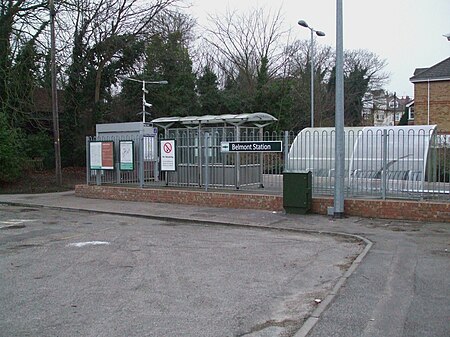Belmont railway station (Sutton)
DfT Category F1 stationsFormer London, Brighton and South Coast Railway stationsLondon stations without latest usage statistics 1415London stations without latest usage statistics 1516London stations without latest usage statistics 1617 ... and 5 more
Rail transport stations in London fare zone 5Railway stations in Great Britain opened in 1865Railway stations in the London Borough of SuttonRailway stations served by Govia Thameslink RailwayUse British English from August 2012

Belmont railway station serves the village of Belmont in the London Borough of Sutton in south London. The station is located on the Epsom Downs line and is in Travelcard Zone 5. It is 16 miles 1 chain (16.01 miles, 25.77 km) down the line from London Bridge measured via West Croydon. It is the closest station to the Royal Marsden Hospital, which is just under half a mile away. On 19 January 2023, Sutton Council were granted £14,121,979 from the government to add a turnback siding to the south of the station to increase capacity to let services run at 4 tph instead of the current 2 tph service patten.
Excerpt from the Wikipedia article Belmont railway station (Sutton) (License: CC BY-SA 3.0, Authors, Images).Belmont railway station (Sutton)
Station Approach, London
Geographical coordinates (GPS) Address Nearby Places Show on map
Geographical coordinates (GPS)
| Latitude | Longitude |
|---|---|
| N 51.344 ° | E -0.1986 ° |
Address
Station Approach
Station Approach
SM2 6DD London (London Borough of Sutton)
England, United Kingdom
Open on Google Maps




